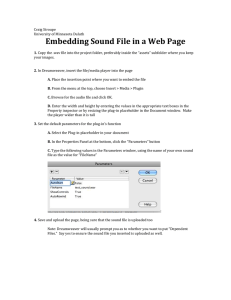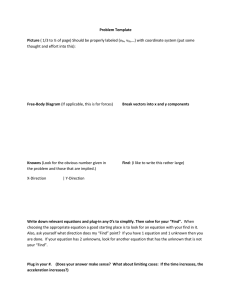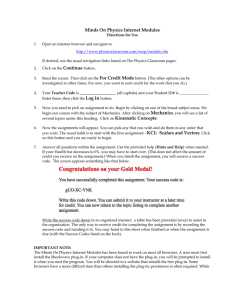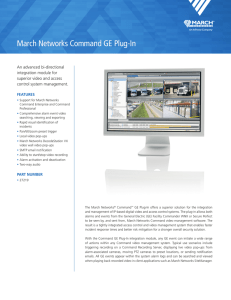Plug-in On/O Socket Kit
advertisement
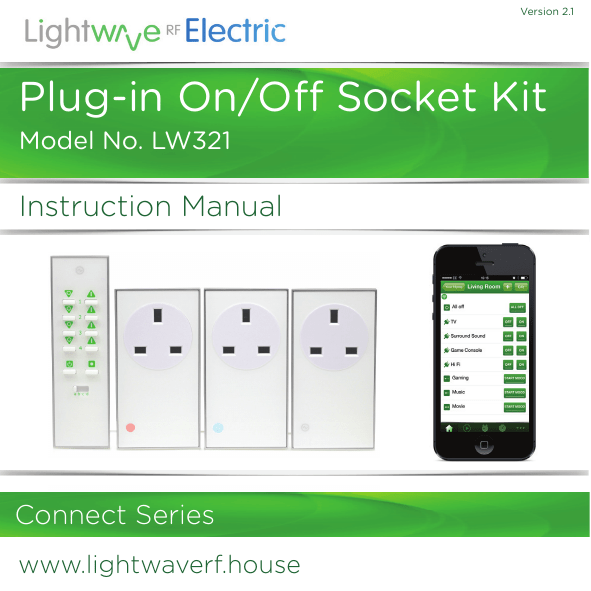
Version 2.1 Plug-in On/Off Socket Kit Model No. LW321 Instruction Manual Connect Series www.lightwaverf.house EC DECLARATION OF CONFORMITY Responsible Authority: LightwaveRF PLC, Innovation Campus Birmingham Faraday Wharf Holt Street Birmingham B7 4BB Tel: +44 (0)121 250 3625 Email: enquiries@lightwaverf.com Model Number(s): Description: Directives this equipment Complies with: JSJSLW321 Plug-in On/Off Kit 2006/95/EC The Low Voltage Directive N/A 2004/108/EEC The Electromagnetic Compatibility Directive 1999/5/EC R&TTE Directive 93/68/EEC CE Marking Directive Standards Applied in order to verify compliance Safety: BS EN 60730-1: 2011 Health: R&TTE: EN 301 489-1 V1.9.2: (2011-09), EN 301 489-3 V1.4.1: (2002-08) EN 300 220-1 V2.1.1: 2006, EN 300 220-2 V2.1.2: 2007 EMC: EN 301 489-1 V1.9.2: (2011-09), EN 301 489-3 V1.4.1: (2002-08), EN 55022: 2010, EN 61000-3-2: 2006 +A1: 2009 +A2: 2009 Class A, EN 61000-3-3: 2008, EN61000-4-2: 2009, EN 61000-4-3: 2006 +A1: 2008 +A2: 2010, EN 61000-4-4: 2012, EN 61000-4-5: 2006, EN 61000-4-6: 2009, EN 61000-4-11: 2004 For and on behalf of LightwaveRF PLC ---------------------------------------Name J Shermer Position Managing Director Get Started How do I get started? Refer to the setup guide on the following pages to get going. No specialist knowledge or tools are required as these sockets are ‘plug and play’. However, always remember to take care when dealing with mains electricity. How does it work? The Plug-in On/Off Socket is designed to plug into any standard 13A socket. It allows any connected lamp (up to 3000W) to be turned on and off and dimmed using the remote control included in this pack, or by using a smartphone / tablet (requires the Lightwave Link). Help video & further guidance For additional guidance, and to watch a video that will help guide you through the installation process, please visit the support section on www.lightwaverf.com Device setup Overview Manual button (on side of Plug-in). Press to toggle Plug-in on/off Transmission LED On & Off buttons Mood button All Off button LED. Blue when power is on / amber when off Bank selector IMPORTANT: Please retain these instructions for guidance on how to link Remote Handsets and other LightwaveRF Controllers. For additional guidance please visit www.lightwaverf.com Device setup Linking the Plug-in to LightwaveRF controllers LightwaveRF Plug-ins each have 6 unique memory slots which means they can link with up to 6 LightwaveRF controllers in total. NOTE: If you are using a smartphone/tablet/PC to control the Plug-in via the Lightwave Link, this will always count as ONE controller and take up one memory slot even if you are using multiple smartphones/tablets. 1. On the Plug-in, press and hold down the manual button until the LED flashes blue/amber alternately. The Plug-in is now in linking mode. 2. On the controller press the button that you intend to link. If using the Smartphone or Web App, press the ‘connect’ button (the App instructions will guide you through this). The LED will flash blue to confirm that the remote is now linked. If you are using a LightwaveRF App, please refer to in-App help for guidance. Device setup NOTE: Linking mode lasts for 12 seconds; if no signal is received from a remote handset during this time then the Plug-in will automatically exit linking mode without linking the device. If, when expecting a quick flashing blue LED to confirm pairing, a slow amber flash is received instead, then the Plug-in memory is FULL and no further remotes may be linked with it unless one of the existing remotes is unpaired first (see below). Unlinking remotes and clearing the Plug-in memory Removing a single device: 1. On the Plug-in, press and hold the Manual button until the LED flashes blue and amber alternately, and then release it. The Plug-in is now in linking mode. 2. Using a LightwaveRF Connect remote or App, press the button intended to be unlinked; the LED on the Plug-in will flash amber to confirm that the remote is now unlinked. Device setup Clearing the memory (will remove all linked remotes): 1. Press and hold down the manual button until the LED flashes blue and amber alternately, and then release it. The Plug-in is now in linking mode. 2. On the Plug-in, press and hold down the Manual button again until the LED flashes purple, then press (don’t hold) the manual button a further time; the LED will flash amber quickly to confirm that the memory has been cleared. NOTE: Reliable range of operation is around 15 metres indoors and up to 100m outdoors using the Lightwave Link. This figure may vary depending upon the environment; very thick walls, bodies of water or large metal objects may interfere with radio range. If the distance between the transmitter and receiver is too great to achieve reliable operation, the LightwaveRF Signal Booster may be used in conjunction with this product to increase the range. Manual operation Plug-in Manual Operation • Plug the LightwaveRF Plug-in On/Off Socket into a standard 13A wall socket and ensure that the wall socket is turned on. The LED on the Plug-in will illuminate amber to illustrate that there is power. • Plug a working electrical device into the Plug-in and ensure that it is turned on. • Press and release the manual button to toggle the Plug-in between the off and on state (amber LED indicator will turn blue and vice-versa). Manual button Remote operation Control with a LightwaveRF controller or Smartphone • Press the ‘on’ button on the controller, Smartphone or Web App once to switch the Plug-in Socket on (LED indicator will illuminate blue). • Press the ‘off’ button on the controller, Smartphone or Web App to switch the Plug-in Socket off (LED indicator will illuminate amber). Using the Handheld Remote This kit comes with a Handheld Remote Control. The remote can be linked to one or more Plug-in Sockets using the method previously described. The Handheld remote has 16 independent channels in total spread over 4 banks. There are 4 sets of on/off buttons on each bank. Each bank (labelled 1, 2, 3 or 4) can be accessed using the ‘bank selector’ switch. Any number of Plug-ins can be linked to a single channel on the Remote. Remote operation The ‘mood’ and ‘all off’ buttons allow the Plug-in Sockets (and/or other LightwaveRF devices) that are linked to the Handheld Remote to be grouped together on one button command. When saving a mood on the remote, the status of any linked devices (i.e. on or off and the dim level) is also saved. This means that, when the Mood button is pressed, the saved status is recalled. By contrast, all linked Plug-ins, by default, respond to the ‘all off’ button and will all turn off whenever this is pressed. Setting and recalling a mood 1. Ensure that all Plug-ins and/or other devices that need to be included in the mood are already linked to the remote (on any bank). 2. Using the remote, or by manual operation, set the linked devices to the status that you want to be saved (i.e. on or off). 3. Press and hold the mood button on the Handheld Remote until the LED indicators on the linked devices flash in recognition. The mood is now saved. To make changes simply repeat the process. 4. Press and release the mood button to recall the saved mood. Press the ‘All Off’ button to turn off all linked devices. Creative ideas 1. (Easy): Family safety Products Required: Plug-in Socket, PIR Motion Sensor Here we have a LightwaveRF Plug-in Socket paired to a PIR Motion Sensor. When somebody is detected by the sensor, it triggers the Plug-in automatically and turns a lamp on. So, when one of the kids needs to use the bathroom in the middle of the night, the path is safely lit for them. The light is then set to turn off once no movement has been detected for a period of time. So, when the little one is safely back in bed, the sensor will turn off that light that is always normally left on! Creative ideas 2. (Intermediate): Scene Lighting Required: Dimmer(s), Mood Controller, Plug-ins Dimmer switches & Plug-ins enable you to control all of your lounge ceiling lights and socket powered lamps individually or together as a group. The Mood Controller allows you to set and recall your own favourite lighting scenes at the touch of a button. You can dim all the lights for watching a movie or create a relaxed mood for entertaining guests. At the end of the evening, press the ‘all off’ button to turn off all lights and lamps. Adding the Lightwave Link allows scene lighting to be controlled via a smartphone. Creative ideas 3. (Advanced): Simulated occupancy Required: Plug-in Sockets(s), sockets or Plug-ins, Lightwave Link This setup gives you control over your devices from anywhere in the world. Here we have ceiling lights controlled by dimmers and lamps plugged into Lightwave power sockets or Plug-in Sockets. Via the Lightwave Link, every light can be controlled using a smartphone wherever you are. So, when you’re away on holiday, you can turn on lights to make it look like someone’s home. You can even set them to come on automatically at different times each evening - enough to fool even the most watchful of intruders! Troubleshooting Problem: The Plug-in will not consistently operate remotely. Solution: The controller/Lightwave Link may be encountering interference or may be at the edge of its reliable range of operation. First, ensure that there are no large pieces of metal or bodies of water in the path of the transmission. If the problem persists, try moving the controller/Link closer to the Plug-in, or consider using a LightwaveRF Signal Booster to extend the range by relaying the signal between controller and Plug-in. Positioning two or more Plug-ins directly next to each other (e.g. in a multiblock) may also cause some radio conflict between the units. Try to place the units 30cm or more apart if possible. Problem: The Plug-in wont turn on/off and displays a flashing amber light. Solution: The Plug-in is locked. This may have been done using a Socket Locker or from the LightwaveRF app. If it is locked on, then the Plug-in will not turn off manually. If it is locked off, the Plug-in will not turn on manually. To unlock the Plug-in, press the unlock button on the Socket Locker or Smartphone App. If this is not possible, the Plug-ins can be reset by unplugging them for a period of 30 seconds. Problem: The LED/CFL lamps I am using flash and don't work properly. Solution: The Plug-in is not compatible with LEDs or low energy CFLs and may not perform properly. Troubleshooting Problem: The Plug-in is powered (LED is on), but it will not link to a LightwaveRF Handset or controller. Solution: Check the controller battery strength: if the battery strength is low, it will not produce enough power to drive the RF radio signal. Tap any ‘on’ button on the controller to transmit a signal. A strong battery signal is indicated by the LED light on the controller remaining lit for 1-2 seconds after releasing the button. A low battery is indicated if the LED light turns off immediately. If this happens, please replace the battery. Problem: The Plug-in is stuck on/off and will not operate manually. Solution: It is possible for the Plug-in to be overloaded if the maximum rating of 3000W is exceeded. This can cause the unit to fail or the software to behave erratically. If this happens please contact technical support via www.lightwaverf.com. FAQs Q. Does the Plug-in work manually as a standalone unit? A. Yes the Plug-in will operate manually. Q. Does the Plug-in have a ‘standby’ power consumption A. The Plug-in has a standby power consumption of approx. 0.5W. This is because the in-built radio receiver requires power in order to receive commands. This rate is low & well within government energy guidelines. Q. Can I use the Plug-in in a multiblock? A. Yes. However, make sure that Plug-ins are not positioned directly next to each other as this could cause radio conflict. Try to ensure that the Plug-ins are positioned 30cm apart for optimum performance. Q. Is it possible to overload the Plug-in? A. Yes. There is a limit of 3000W; exceeding this could damage the unit. Q. How many devices can I have on the Lightwave system? A. Each device has 6 memory slots for up 6 controllers. Note: The Lightwave Link allows a number of different smartphones to control the Plug-in independently, however it only uses one memory slot. FAQs Q. Can I incorporate a Plug-in into a mood? A. Yes: Plug-ins can be incorporated into a mood. Q. Can I turn off the LED indicator light? A. No it is not possible to turn off the LEDs as they are necessary to signify the Plug-in’s status. Q. Can I lock the Plug-in? A. Yes the Plug-ins can be locked on or off. Q. Can I use the Plug-in with lamps? A. Yes. You can also use a LightwaveRF Plug-in Dimmer if you wish to dim your lamps. Technical Specification Specification RF frequency: 433.92 MHz Output rating: 3000W Max. Standby Energy Use: Less than 1W Warranty: 2 year standard warranty BS 1363 Certified Version 2.1 2 Quadrant Park Mundells Welwyn Garden City Herts AL7 1FS 01707 386035 www.lightwaverf.house
